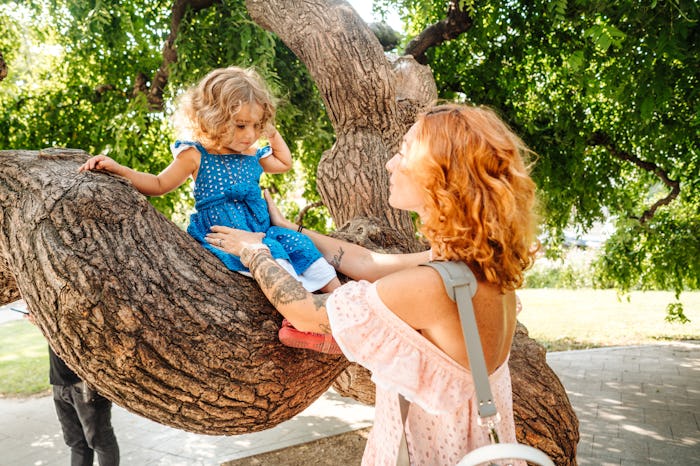Even without being a total helicopter parent, it's hard to watch your kids play sometimes or try things that might hurt them, whether it's climbing a tree in the backyard or trying out for the dance team with their two left feet. But as adults, most of us know that risk-taking is worth it most times. It might be good for kids, too, according to a new study that found encouraging kids to take risks helps their mental health later on in life. Namely, they end up with less anxiety overall.
Researchers from Macquarie University's Center for Emotional Health and the University of Amsterdam and Reading surveyed over 300 families with preschool aged kids in the Netherlands and Australia. They found that parents with high "challenging parent behavior" methods had kids who were way less likely to exhibit symptoms of anxiety disorders, according to a statement released by the universities.
You don't have to tell your kids to do things that might actually harm them! Challenging parent behaviors, or CPBs, are defined by the researchers as things such as giving your kids a "fright, engaging in rough-and-tumble play or letting them lose a game, as well as encouraging them to practice social assertion and confidently enter into unfamiliar situations."
Most parents might think that their kids are already at risk of throwing a tantrum or hurting themselves every single morning in the playroom, but there are ways to introduce these kinds of parenting behaviors into every day life, even if it's just letting your kids fight it out amongst themselves, let them make their own lunch, or beat them at a video game sometimes.
The study has a few implications, especially given that anxiety is on the rise among children and teens. According to Psychology Today, about 25 percent of kids aged 13 to 18 have an anxiety disorder. Of course, anxiety and depression can be treated, but if there are ways to decrease the likelihood of it every developing through play, all the better, right?
Professor Jennie Hudson, Director of Centre for Emotional Health at Macquarie University and co-author of the study told MedicalXpress:
Around seven per cent of Australian kids between the ages of four and seventeen have an anxiety disorder. The fact is that we really need to learn more about how we can help families to reduce this percentage. While previous research has shown that encouraging risk taking behaviors helps cognitive, social and emotional development, our study shows that this method of parenting may also help reduce the risk of children developing an anxiety disorder.
So lowering the rates of anxiety is one thing. But think about this: Young girls are way more likely to develop anxiety and depression earlier than young boys are, and the symptoms stick with them for the rest of their lives, according to The Guardian.
Rebecca Lazarus from Macquarie University, another co-author of the study, said in a statement that they found that mothers showed no difference in CPB methods towards their sons and daughters, but that fathers exhibited more rough and tumble play with sons over their daughters.
That means that boys were more likely to be encouraged to take a risk, possibly lowering their chances of developing an anxiety disorder later on in life, if the results of this study are correct.
We know that the way we socialize boys and girls can teach them about "gender roles," especially if a parent allows a son to play a little rough but keeps their daughter inside to play more quiet games. It might also be leading to anxiety symptoms later on, as this research suggests.
So obviously, don't let your kids hurt themselves. But maybe a tumble here and there isn't so bad for them after all. Or at least that's what you can tell yourself to ease your mom-guilt.
Check out Romper's new video series, Romper's Doula Diaries:
Watch full episodes of Romper's Doula Diaries on Facebook Watch.
